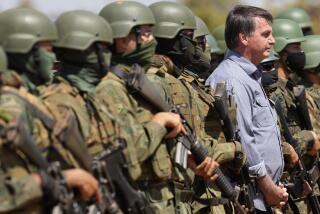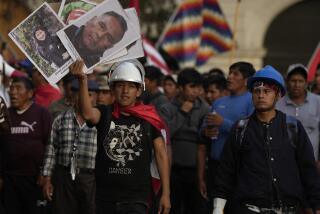Probes of Unrest, More Military Benefits Urged in Philippines
- Share via
MANILA — Key Philippine political leaders began pushing Monday for increased military benefits and impartial investigations into the unrest in the armed forces that triggered last Friday’s bloody coup attempt, and hundreds of Philippine Military Academy cadets staged a hunger strike to protest the government’s use of force to put down the rebellion.
Leaders of the mutiny against President Corazon Aquino and her military chief of staff, Gen. Fidel V. Ramos, continued to elude a manhunt in the province north of Manila. And political rightists handed out an unverified and unsigned statement declaring that the rebel troops have established a provisional military government somewhere in the central regions of Manila’s island of Luzon.
Military sources close to the rebels said they could not authenticate the document, dated Aug. 29 and announcing the formation of a “ruling junta” in the name of the armed forces because “the Aquino government has declared an all-out war against the freedom-loving members of the New Armed Forces of the Philippines.”
Sympathy for the rebels’ cause spread to the Philippine version of West Point, the military academy in Baguio where Lt. Gen. Eduardo Ermita, armed forces deputy chief of staff, tried to settle a two-day-old hunger strike by all 600 cadets. Sources at the academy said the general had so far failed to end the protest.
Salvador Laurel, Aquino’s vice president, attempted to defuse the anger and unrest in the armed forces that has not abated since Ramos used air strikes, artillery and thousands of ground troops Friday to storm Manila’s Camp Aguinaldo, where coup leader Col. Gregorio (Gringo) Honasan and hundreds of military supporters staged their 20-hour mutiny.
Expressing sympathy for grievances that the rebels said led them to attempt the coup, Laurel announced that he has urged Aquino to form “a special, high-powered, no-nonsense, nonpolitical, swift and discreet commission to look into the root causes of military unrest.”
Laurel, who came to office with Aquino after a church-backed military-civilian uprising deposed then-President Ferdinand E. Maros in February, 1986, released the text of a letter he gave to Aquino. It declared, “If we have endeavored to win the hearts and minds of the people in our fight against (the country’s Communist) insurgency, we can do no less in addressing the problem of military unrest.”
The usually silent vice president stressed that he is not supporting the rebels, for whom Aquino has issued shoot-to-kill orders. “But when people are prepared to die for something, we must look into the root causes of it.” If the president rejects his suggestion, Laurel added, “the military will be demoralized.”
Juan Ponce Enrile, a former member of Aquino’s Cabinet who is now a top leader of her political opposition, made the same case in much stronger terms.
In his first public appearance since Friday’s failed coup, Enrile, for whom Honasan served as security chief and adviser until Aquino fired Enrile as defense minister last November, attacked Aquino for creating a state of “gloom, despair and drift” in the country, which he said triggered the attempted coup.
“Some would say that we are in a state of anarchy,” Enrile told a Rotary Club meeting Monday. “Last Friday’s event is only a symptom of our national condition. It is like a high fever that indicates a grave illness, and this grave illness has affected the entire body politic.”
Neither Defend Nor Condemn
Enrile, charging that Aquino’s government lacks “statecraft” and is “unwilling to carve a sound political direction for our republic,” said that “I shall not say anything to defend or to condemn their (the coup leaders’) acts, for they are men enough to defend themselves and to hold themselves accountable for their deeds. Enrile has denied involvement in the failed coup.
Many Aquino supporters, however, doubted Enrile’s denials. Congresswoman Lorna Yap, a key Aquino supporter in the House of Representatives, said she believed that the rebel leaders were “the same men who are backing up Juan Ponce Enrile.”
Enrile was fired amid rumors that Honasan and other Enrile supporters were plotting such a coup last Nov. 23, and Yap said “it’s foolhardy for Enrile to try to distance himself” from the coup planners. “It would be difficult to prove that they have any connections in this one, but everyone believes it anyway.”
Yap vowed to initiate an investigation into whether Enrile played a role in the uprising.
But the congresswoman, whose husband was Aquino’s first military aide de camp, also began efforts in the House to increase the pay and benefits for all soldiers and officers in direct response to grievances aired by the rebel leaders at the height of the coup attempt.
In the Senate, Raul Manglapus, an exile under Marcos and frequent critic of the Philippine military, noted in an eloquent assessment of the coup from the floor of the chamber that “the armed forces of the New Democracy are the same armed forces of the old, outgoing regime.”
Manglapus, however, proposed a four-point plan, endorsed by other key senators, aimed at improving the pay and quality of life of members of the armed forces.
“It does no violence to our nature and our constitutional system to acknowledge that this valiant expose of the soldier’s life (to war) deserves special attention,” Manglapus declared.
Manglapus added that he suspects that American ultra-rightists--he specifically mentioned retired Gen. John Singlaub and the CIA--helped or encouraged the rebel leaders.
Noting that Singlaub spent more than a month in the Philippines last year and hinting that he had met with Honasan and other coup leaders, Manglapus urged the Senate to investigate possible foreign interference in Philippine affairs.
President Aquino, meanwhile, received praise for her tough and resolute handling of the uprising, which confronted her government with the gravest crisis of its 18 months in office. And in the wake of her apparent victory against a rebellion that left at least 42 people dead and hundreds wounded, the Manila stock market rallied and businessmen expressed renewed confidence in her government.
Newly arrived U.S. Ambassador Nicholas Platt visited Aquino and personally delivered a message from President Reagan “expressing gratification at the resolution of the crisis and firm support for President Aquino and for Philippine democracy,” Platt told reporters afterward.
In Congress, where Aquino supporters form a majority in both houses, a resolution was approved Monday night expressing a “deep sense of admiration and respect for (Aquino), for the strength, courage and grace she showed in handling the Aug. 28 mutiny.”
Many leaders remained deeply concerned, however, that with Honasan and other coup leaders still at large, another uprising could occur.
More to Read
Sign up for Essential California
The most important California stories and recommendations in your inbox every morning.
You may occasionally receive promotional content from the Los Angeles Times.













